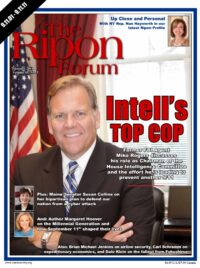
To many observers, the successful May raid that led to the death of Osama bin Laden marked a comeback for the United States Intelligence Community. Special Forces under the control of the CIA gave America the final say in a chapter that began when Al Qaeda attacked the homeland on 9/11. A beleaguered intelligence community that once was not equipped to detect the extent of the threat posed by al-Qaeda had worked seamlessly to execute one of the most daring and successful raids in modern times.
We have come a long way from the dispirited, stove-piped intelligence community we had in September 2001. The collapse of the Soviet Union and end of the Cold War were a bleak period for the community, when budgets were slashed, the mission was poorly defined and human intelligence became virtually nonexistent. It was in this gap, created by shortsighted planning and budget decisions by Washington policymakers, that Al Qaeda found the space it needed to grow. There is no question that 9/11 was an intelligence failure. However, the failure was not on the part of the men and women of the community. It was on the part of the political leadership in the nineties.
There is no question that 9/11 was an intelligence failure. However, the failure was not on the part of the men and women of the community. It was on the part of the political leadership in the nineties.
Why, it is right to wonder, would politicians not ensure that America maintained a robust intelligence capability? The first reason is a challenge that our government is facing at this very moment — they saw it as simply a budget issue. The fact of the matter is intelligence is expensive. Human assets — the core resource of the CIA — cost money. Technology, whether it is NSA supercomputers or spy satellites flown by the National Reconnaissance Office, costs a lot of money. In the face of tight budgets, government shutdowns and the mistaken belief that we could reap the so-called peace dividend in the mid-nineties, bad decisions were made to cut investments in intelligence capabilities. And the results were clear.
America’s aging constellation of spy satellites would be pushed beyond their design life with no long-term or comprehensive plan for replacement. We curtailed human intelligence collection, leaving large regions of the world with few if any assets in place, and we reduced the hiring and training of the case officers we count on to recruit spies. The bottom line is we were penny-wise and pound-foolish, and in the process, we sacrificed America’s first line of defense on the altar of budget expediency.
The other major reason that intelligence faltered in the nineties is that some politicians saw it as a “dirty job.” It is not a secret that there is nothing nice about trying to steal someone else’s secrets. The reality is, however, if we are going to disrupt hostile plots against the homeland, then we need to be able to operate in the dark and gritty streets of faraway places. Best plans and intentions can fail, and sometimes spies get caught, all of which can be difficult. But it was a mistake in the nineties for America to stop doing the hard things just because they were hard and politicians were unwilling to take the risks that good intelligence requires.
The 9/11 attacks provided a jolt to the way we perceive threats to our national security. America has reinvested in a robust intelligence capability. Scores of new recruits have beefed up our human collection and our technology has been updated. This has enabled the United States to not only effectively wage a war against Islamic extremists, but to extend our ability to cover threats from foreign adversaries around the world.
Simultaneously, American leadership on both sides of the aisle has broadly embraced the necessary work of intelligence. President Barack Obama — perhaps the harshest critic of the Bush Administration’s national security policies — has embraced and in some cases increased their use, by admission of his own officials. Guantanamo Bay remains open, the Obama Administration has said it will hold detainees indefinitely, and they have brought back Military commissions. Indeed, with the exception of insisting on interrogating enemy combatants using the publicly available Army Field Manual, it can be hard to tell the difference between the two administrations’ policies.
President Barack Obama — perhaps the harshest critic of the Bush Administration’s national security policies — has embraced and in some cases increased their use, by admission of his own officials.
Beyond a doubt, I believe America’s intelligence community is back with renewed and strengthened capabilities that help keep America safe. But there continue to be issues. We must improve the quality of intelligence analysis, which continues to downplay the threat posed by Iran’s nuclear program and failed to predict the “Arab Spring.” We must also guard against the push by some to slash intelligence budgets, capabilities and authorities in the current Beltway budget mess.
If we learned anything from the 9/11 attacks, it is that we cannot afford to let history repeat itself. It is far more expensive to rebuild our intelligence capability after an attack than to maintain it to help prevent the next one. Over the past decade, we have seen what an effective intelligence community looks like.
It is learning and adaptive, it takes risks, makes apolitical judgments and is accountable to the President and Congress, with their support and the resources to get the job done.
Pete Hoekstra, a former Michigan congressman, served as chairman and ranking member of the House Intelligence Committee. He is now president of Hoekstra Global Strategies.




